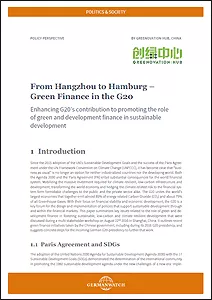
Since the 2015 adoption of the UN’s Sustainable Development Goals and the success of the Paris Agreement under the UN Framework Convention on Climate Change (UNFCCC), it has become clear that “business as usual” is no longer an option for neither industrialized countries nor the developing world. Both the Agenda 2030 and the Paris Agreement (PA) entail substantial consequences for the world financial system. Mobilizing the massive investment required for climate resilient, low-carbon infrastructure and development, transforming the world economy and hedging the climate-related risk to the financial system form formidable challenges to the public and the private sector alike. The G20 unites the world’s largest economies that together emit almost 85% of energy related Carbon-Dioxide (CO2) and about 75% of all Greenhouse Gases. With their focus on financial stability and economic development, the G20 is a key forum for the design and implementation of policies that support sustainable development through and within the financial markets. This paper summarizes key issues related to the role of green and development finance in fostering sustainable, low-carbon and climate resilient development that were discussed during a multi-stakeholder workshop on August 22nd 2016 in Shanghai, China. It outlines recent green finance initiatives taken by the Chinese government, including during its 2016 G20-presidency, and suggests concrete steps for the incoming German G20-presidency to further that work.



